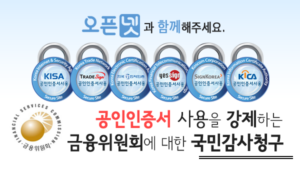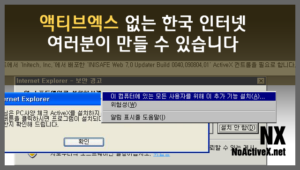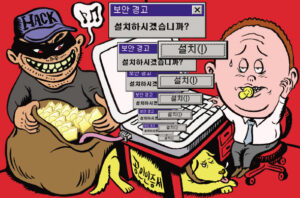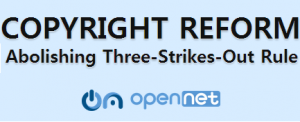Press Release
Political Polarization Manifests on YouTube – Hardcore Supporters on Both Sides More Likely to be YouTube Subscribers, YouTube Users More Willing to Reject Constitutional Court Ruling
As the Constitutional Court’s ruling on the impeachment trial of President Yoon Suk-yeol draws...
Open Net Backs Internet User in Criminal Defamation Case Brought by Webtoon Artist
Open Net recently provided legal assistance to an internet user who was sued for a criminal insult...
Open Net Asked X (formerly Twitter) to Unblock the Banned Account for Sex Worker Advocacy Organization
Open Net Korea urged X (formerly Twitter) to reinstate the account of the sex worker rights...
Petition for “Documentary director Jung Yoon-seok Not Guilty of Documenting the Western District Court Riots” was Submiited by 169 Organizations and 11,831 Citizens
Director Jung Yoon-seok was charged by prosecutors after entering the Western District Court to...
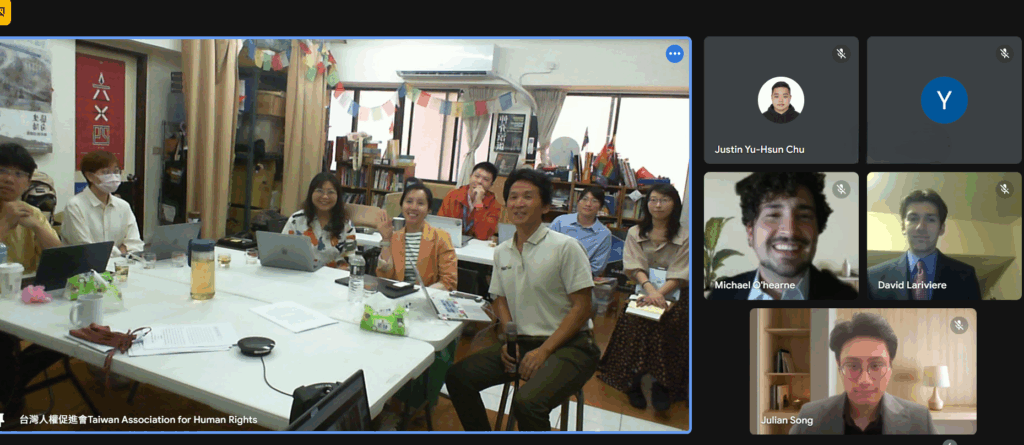
Protected: Open Net and TAHR hold expert consultation on impact litigation on targeted advertising
Password Protected
To view this protected post, enter the password below:
LITIGATION
Seoul Administrative Court Affirms PIPC’s sanction on Meta for third party targeted advertising for lack of effective consent; Meta has yet to mend
The Seoul Administrative Court decided on January 23, 2025 (Case No. 2023Gu-Hap54259) to affirm...
Regrettable Court Ruling that Filing a Police Complaint Violates Personal Information Protection Act
On October 24, the Busan District Court in South Korea ruled that including personal information...
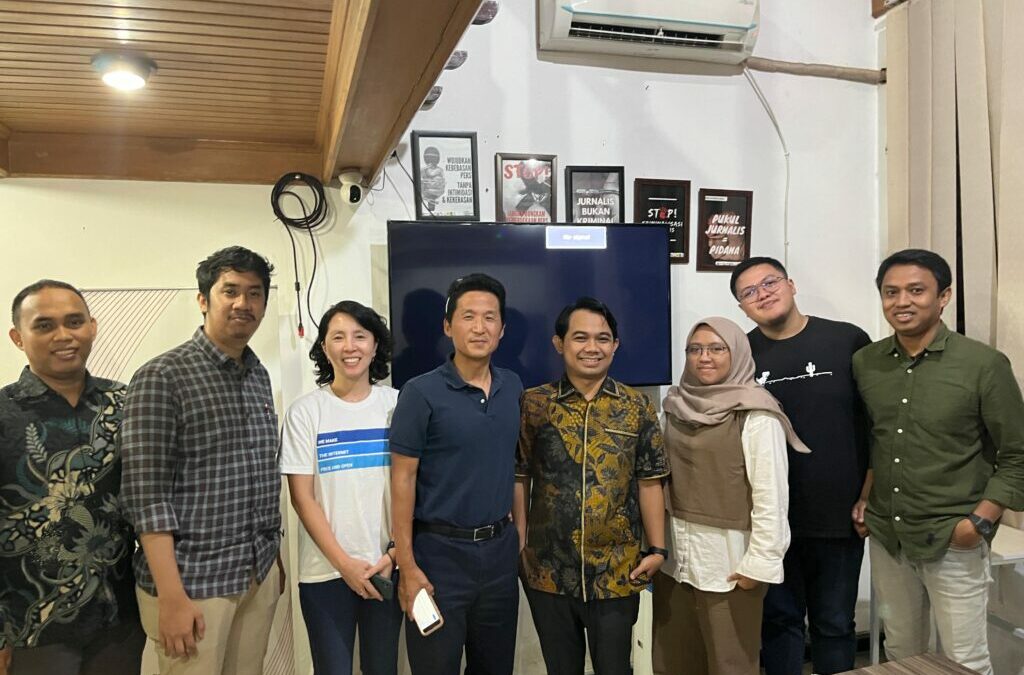
Open Net and LBH PERS hold a joint seminar on constitutional challenge against Indonesia mandatory website registration law
On May 27, 2024, Open Net and LBH Pers held a joint seminar at the office of LBH Pers, Jakarta,...
Overseas experts lean in on Julian Assange-type prosecution of an opposition politician for sharing legally acquired diplomatic secrets
On July 1, 2024, the University of California at Irvine Law School's International Justice Clinic,...
US Experts lean in on Loui Vuitton’s trademark suit against Korean bag repair shops
On August 21, 10 US-based law professors with expertise in intellectual property law filed a joint...
OPEN SEMINAR
[RightsCon 2025] Defamation Law Undermining Freedom of Press – Media Defence Roundtable Review
Open Net Korea participated in a roundtable hosted by the Media Defence on February 24, 2025, as...
[Colloquium Presentation] The Bizarre World of Happiness Drawn by Image Generative AI
On January 17, 2025, Kyoungmi (Kimmy) Oh attended a colloquium titled “Is Generative AI a Game...
![[RightsCon 2025] Data Privacy in the Era of AI: Public and Private Sector Perspectives](https://www.opennetkorea.org/wp-content/uploads/et_temp/RC25_Poster-for-Data-Protection-Session-819x1024-600353_819x675.png)
[RightsCon 2025] Data Privacy in the Era of AI: Public and Private Sector Perspectives
On Feb 27, 2025, Kyoungmi (Kimmy) Oh gave a speech in the session, "Data protection in the era of...
![[RightsCon 2025] Emotional Activism: Re-humanizing Digital Spaces and Narratives for Collective Care Action](https://www.opennetkorea.org/wp-content/uploads/et_temp/RightsCon-1-127065_940x675.jpg)
[RightsCon 2025] Emotional Activism: Re-humanizing Digital Spaces and Narratives for Collective Care Action
On Feb. 26th, 2025, Kyoungmi (Kimmy) Oh participated in the workshop, “Emotional Activism:...
2024 Cultural Diversity Seminar: Questions for Expanding Cultural Diversity in the Digital Environment
On December 18, 2024, the Wanju Cultural Foundation held a seminar on cultural diversity,...
COURT ACTIONS
Standing in solidarity with the Women and People of South Korea as the Government Denies Sexual and Reproductive Health Rights
Women On Web, an online organization committed to providing vital information on sexual and...
[Statement] The Industry Protection Act Task Force Expresses disappointment with the Court’s Decision to Dismiss the Constitutional Complaint on the Industry Protection Act: the Task Force will Try to Recover the Right to Know which is Insulted by the Industry Protection Act at Our Best
Seeking unconstitutional litigations for individuals and companies on unfair trial for 'tech...
[Open Net and ARTICLE 19 to the Constitutional Court of Korea] Repeal Article 7 of the National Security Act
Open Net and ARTICLE 19 submitted a third-party intervention to the Constitutional Court of Korea...
Open Net Welcomes Court’s Ruling That Nonprofit Organizations’ Use of “Free Font” Is Fair Use of Works
Open Net Welcomes Court’s Ruling That a Nonprofit Organization’s Use of "Free Font" Is Fair Use A...
Open Net Successfully Defends Against Exploitative Font Copyright Lawsuit in Its Public Interest Litigation Case
You can read the Korean original here.
education
Political Polarization Manifests on YouTube – Hardcore Supporters on Both Sides More Likely to be YouTube Subscribers, YouTube Users More Willing to Reject Constitutional Court Ruling
As the Constitutional Court’s ruling on the impeachment trial of President Yoon Suk-yeol draws...
[Industrial Technology Protection Act Committee] Amendments to the Information Disclosure Act raise serious concerns about potential violations of workers’ safety and the right to know
see https://www.opennet.or.kr/25406
[Joint Statement] The Ministry of the Interior and Safety Must Immediately Withdraw Its Attempt to Undermine the Information Disclosure Act
see https://www.opennet.or.kr/25323
Open Net Backs Internet User in Criminal Defamation Case Brought by Webtoon Artist
Open Net recently provided legal assistance to an internet user who was sued for a criminal insult...
Open Net Asked X (formerly Twitter) to Unblock the Banned Account for Sex Worker Advocacy Organization
Open Net Korea urged X (formerly Twitter) to reinstate the account of the sex worker rights...
POLICY RESEARCH
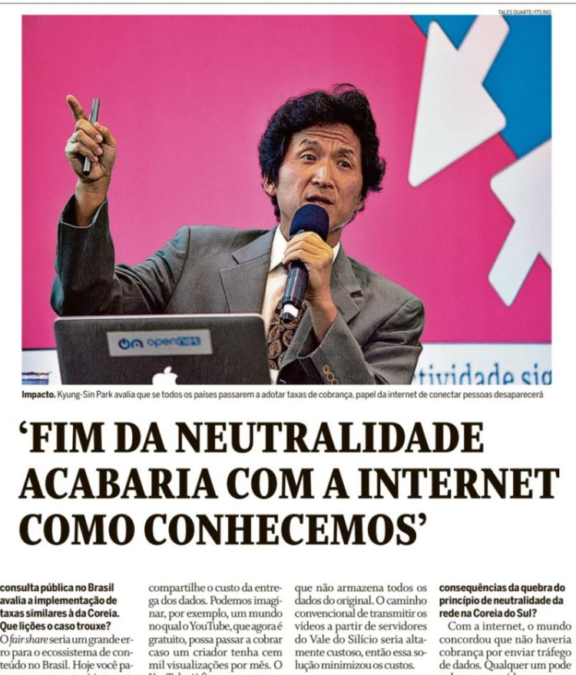
Open Net Speaks to Brazil and ANATEL on network usage fee proposal
On April 28, K.S. Park spoke at an event organized by ITS Rio and Association for Progressive...
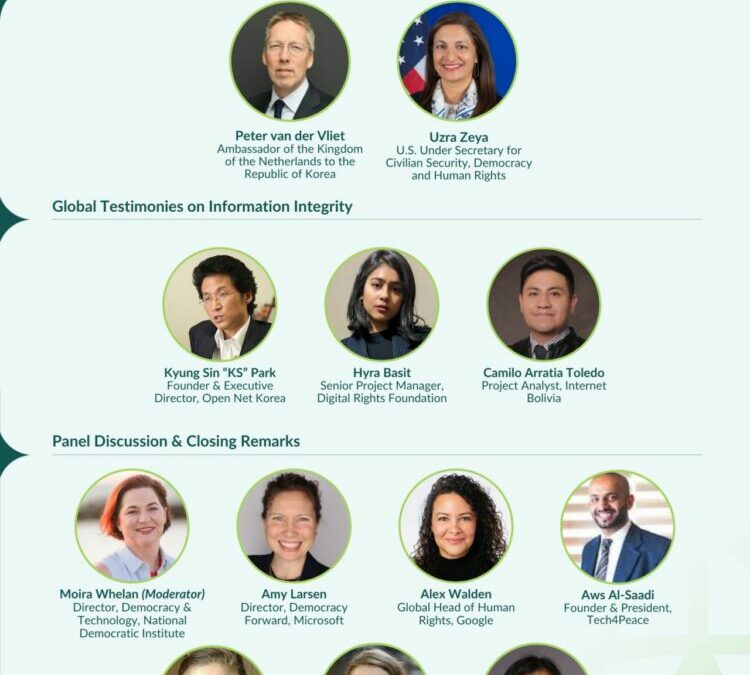
Summit for Democracy Seoul: Freedom Online Coalition workshop on information integrity
On March 19, 2024, Open Net's Executive Director K.S. Park spoke at a Freedom Online Coalition...
Civil Society Condemn Police Threatening Search and Seizure for Presidential Satire!
Tuesday, February 27, 2024, 11:00 AM | In front of Seoul Metropolitan Police Agency (Gyeongbokgung...
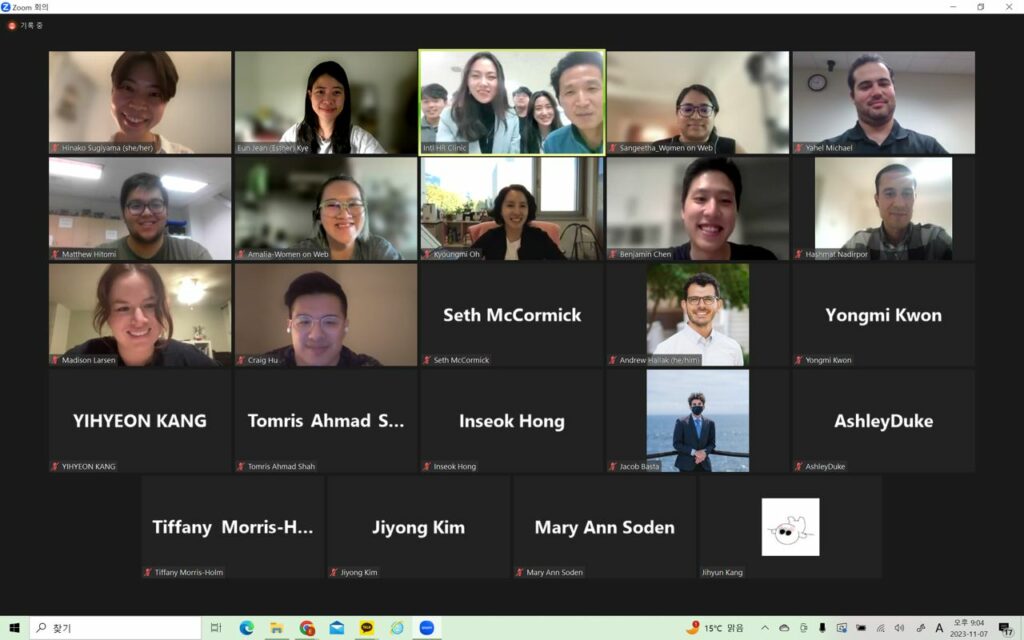
2023/11/9 Joint seminar: UC Irvine Int’l Justice Clinic & KU Int’l Human Rts Clinic on Women on Web
On November 9, 2023 (KST), UC Irvine Law School’s International Justice Clinic and Korea...
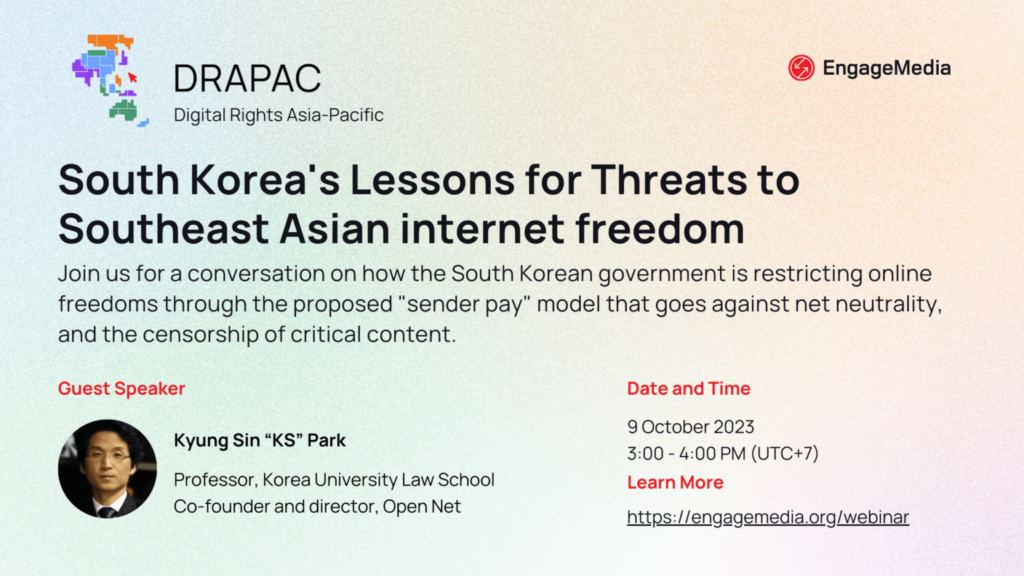
DRAPAC Series: South Korea’s Lessons for Threats to Southeast Asian Internet Freedom
In this episode of the DRAPAC Series, Kyung Sin ‘KS’ Park, a professor at the Korea University...
CAMPAIGN
Stop Internet Censoring
We have seen many attempts to censor the Internet under the pretext of copyright protection. Notorious attempts are SOPA and PIPA of 2012, which triggered the largest online protest in history and was eventually withdrawn, and ACTA, a plurilateral trade deal killed by the European Parliament in 2012. Now, Korean government tries to enact a much stronger internet censoring rule. If it passes the legislative body, a copyright protection agency may cut off access to websites that the agency views as copyright infringing. The concerns over mass surveillance and privacy vulnerabilities by the proposed rule are widespread amid the government’s new drive to block “https” traffic by SNI eavesdropping (See, press release of Korea Communication Commission on February 12, 2019 and press release of MCST on May 2, 2018, both in Korean).
Intermediary Liability Campaign
Korean law (Copyright Act Article 103, Information Communication Network Act Article 44-2) requires intermediaries to take down all content for which anyone sends a takedown notice, regardless whether the content violates any right or law, not as a condition of qualifying for a safe harbor but as a positive obligation. As a result of this ‘mandatory’ notice-and-takedown system, the intermediaries are forced to take down thousands of contents daily which they believe to be perfectly lawful. Also, Korean laws require some intermediaries like P2P and cyberlockers to implement ‘technical measures’ to filter out copyright infringing material (Copyright Act, Article 104) and obscenity (Telecommunications Business Act Article 22-3 Paragraph 1), and requires all intermediaries to implement technical measures to filter out child pornography (Children and Juvenile Sex Protection Act Article 17). These ‘technical measures’ requirement ends up requiring the intermediaries to monitor each and every third party content posted on their services, turning the Internet into a space open to only those contents implicitly permitted by the intermediaries.
Open Net Korea has engaged in various efforts to bring the Korean law into compliance with the international norm, including but not limited to participating in the Steering Committee of the Manila Principles for Intermediary Liability, co-authoring a Good Practice Guideline for Intermediary Liability Regime published by the Network of Centers for Internet and Society, and calling the international community to write to the relevant officials.
Open Payment Campaign
Currently, the law requires all online payments above 300K Korean won (about US$300) to be signed by so-called “accredited certificates”, which are backed only by a Korean government agency operating as a root CA but none of the internationally recognized certificate accreditation agencies and therefore require various plugins to be downloaded from various vendors (most often through Active X technology due to the 90% plus dominance of Internet Explorer in the country) enabling and protecting the certificates. Such monolithic “closed” payment rule made the Korea-based e-commerce inaccessible for overseas customers and very inconvenient for domestic customers and indoctrinated Korean customers into a dangerous habit of accepting downloads of unknown origins, who therefore became easy targets for pfishing and other financial frauds. Open Net calls for the dismantling of the payment rule mandating use of the government-backed-certificates that are not really “accredited” in any global sense.
In 2013, Open Net ran a petition drive to file a Citizens’ Audit on the Korean Financial Services Commission responsible for implementing the closed payment rule, and obtained the sponsorship of more than 300 signatories who signed on-line at this site.
In 2013, Open Net ran a grassroots petition drive here to demand that the authorities overhaul the online payment rule so that the Korean net users can make payments without the nail-biting, computer-freezing, caution-numbing downloading of all the plugins. Several thousands have signed on putting pressure on the legislators and authorities.
In the latter half of 2013, Open Net lobbied for a Digital Signature Act amendment bill allowing digital signatures to be approved by internationally recognized root authorities and a Electronic Financial Transactions Act amendment bill requiring the Financial Services Commission rule-making to be technology-neutral in accordance with the Basel Principles. Here is the campaign headquarter page from which people will gather information and write mails, Twits, FB entries alerting the relevant lawmakers.
“Real” Child Abuse Prevention Campaign
The law punishes virtual images of imaginary children such as in animation and adult-actor films under the same legal scheme as child pornography made of video-recording or “morphing” of real children, which carry mandatory minimum sentence of 5 years for production and, among other things, 10 years of employment ban and 20 years of residential address tracking, not to mention the stigma of “child sex offenders”. Such law resulted in police actions focused on online uploading and downloading of files at the expense of depleted resources for pornography involving real children, which ironically ended up indictment of juvenile computer users as “child sex offenders”. Open Net calls for amendment of the Child and Juvenile Sexual Abuse Prevention Act to make the law serve its real purpose.
Campaign to Strike Out the Three Strikes Rule
In Korea, the copyright Three-Strikes-Out Rule came into effect on July 23, 2009 and gave the government a power to disconnect users from the Internet in the name of copyright protection. So far, although no one has been disconnected from the Internet, 408 website accounts have been shut down and 468,446 warnings or takedowns have been executed by the South Korean government (The Ministry of Culture and the Korean Copyright Commission, an entity empowered to do so without judicial scrutiny under the three-strikes rule). There is no prior judical scrutiny. The government has the full discretion in determining whether the postings or the user accounts are to be taken down or not. This is administrative censorship done fast and cheap for the rightholders, however, suppressing freedom of expression and communication and Internet users’ fundamental right to access, and endangering the future of the free and open Internet.

